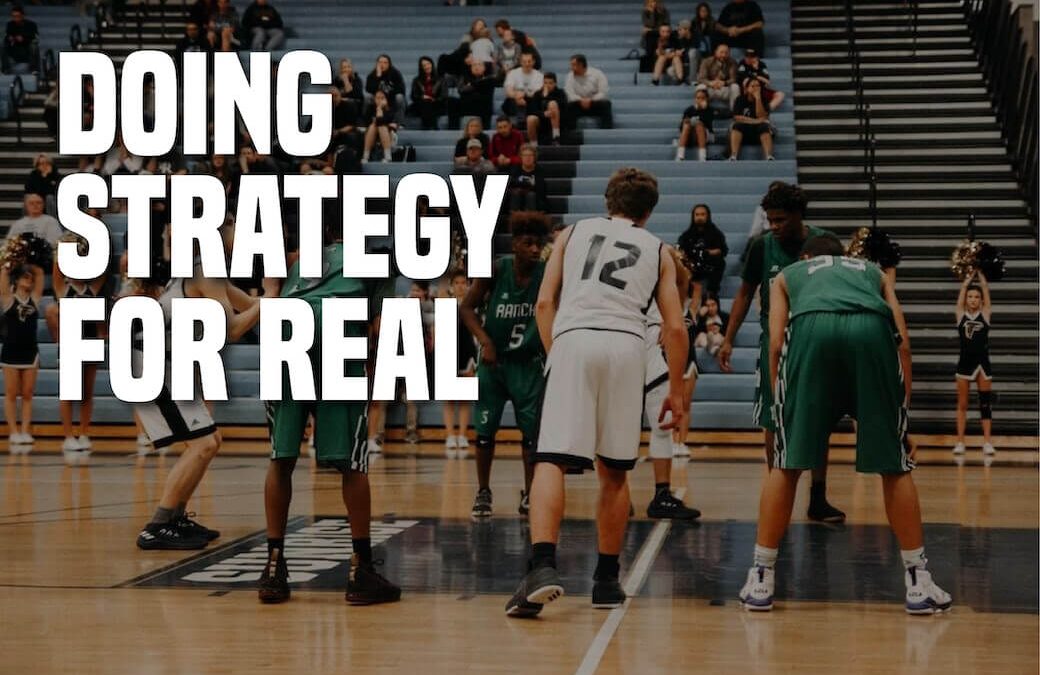Strategy is like sport: there are more pundits than players...
People love talking about strategy, what it is and isn’t, whether formulation or execution is more important, what the difference is between strategy and tactics, and so on.
But how many people actually do strategy? When was the last time they played the strategy game for real?
Talking about strategy and doing strategy are different ball games. The biggest difference is how few strategy frameworks and tools are used in an actual strategy creation process.
Classic strategy tools like SWOT analysis, Five Forces Analysis, Growth-Share Matrix are the bedrock of most strategic analyses. But strategy has boomed in the last 60 years and there are now thousands more to choose from! Consultants BCG advise companies to create meta-strategy (“Your Strategy Needs a Strategy”) to define what kind of strategy to use in different business situations.

But, if you are thinking “wow, with all this new strategy stuff the business world must be well-tuned into strategy”, you are in for a surprise.
Business surveys show executives rank strategy as one of their weakest skills [1] and that most strategies fail [2].
So why is there so much strategy and so few results? The gap between strategy tools and strategy performance suggests something else is needed to be successful with strategy.
The answer is that frameworks help analyse situations and provide structure for options and decision making, but they depend on people thinking and behaving strategically in the first place to have any chance of producing an effective strategy.
Renowned author and professor in strategy, Henry Mitzberg, makes the observation that no one has ever developed strategy using a series of analytical techniques. And we agree, it just doesn’t work like that. Just as no football team has ever won a game by sticking to their training ground moves in front of the opposition.
Another authority in the strategy space, Roger Martin, goes even further. He says that strategies based on data are an “analytical delusion”. Strategy can’t be inferred from data because data is inherently about the past. There is no data about the future – you have to make the data by developing and implementing a strategy!
Neither guru says that strategy frameworks and tools are not worth using. Of course, you need to be fit to play the game: you need to understand customers, competitors, costs, technology, and trends. But when the whistle blows, you need to live and breathe strategy. You need to be strategic rather than know about strategy.
What is ‘being strategic’?
Being strategic means making sense of the analysis you have done, producing insights, and making an interpretive, and creative decision about what could be, rather than what is already known. Strategy is synthesis, not analysis. The ability of individuals, teams and entire organizations to be strategic has a much greater influence on the quality of strategy and strategic outcomes than knowledge of strategic frameworks, despite what the strategy consultants may tell you.
What does ‘being strategic’ actually look like, in individuals, in teams and in organizations?
In our experience, strategic people are aware and have an insatiable desire for information. Their temperament and thinking styles are alert, non-dogmatic, logical, and conceptual. They tend to have a modern outlook, are pro-change, customer-oriented, experimental, inclusive and valued-based.

Strategic teams are diverse, collaborative, well-informed, good at dialogue and systems thinking, realistic in balancing the near term and the long term, non-political, and collectively commit to decisions.

Strategic organisations are adaptable, able to respond to market opportunities, and designed to facilitate the rapid flow and sharing of information, people, and capital to capture new opportunities, maintain relevance and advantage.

Being strategic is more than learning the latest strategy framework. Staying strategic is even more challenging, as strategic success can breed complacency and ego, the antidotes to being strategic. The fundamental reason Kodak, Blockbuster, Nokia and many other ‘disrupted’ companies failed was not that they had the wrong strategy, but because they failed to be strategic.
Effectus Research has spent 25 years studying and working with global companies to help individuals, teams and enterprises become more strategic. We have a deep understanding of what it takes what traps to avoid.
Want to see more? Follow our company Linked In page, Effectus Research, for further posts on ‘Being Strategic’.
If you would like to be more strategic, keep an eye out for our upcoming webinar series, where we will share our insights about strategic people, strategic teams, and strategic organizations.
Sources
1. “Strategy Implementation: What Is the Failure Rate?” Journal of Management & Organization
2. MIT SLOAN (https://sloanreview.mit.edu/article/open-up-your-strategy/ )

